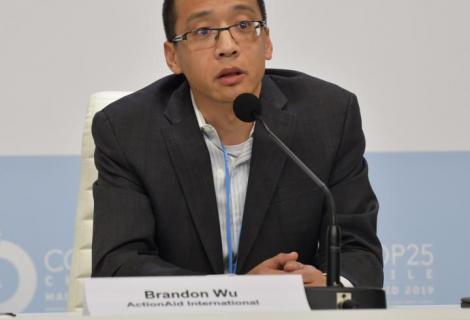In climate talks, rich countries are getting away with murder

This piece is by Brandon Wu, Director of Policy and Campaigns, ActionAid USA and is based on his contribution to a panel event at the UN climate conference in Madrid, exploring the limitations and history of the Paris Agreement.
The Paris Agreement is a story of escape. It’s the culmination of a years-long Great Escape of responsibility by rich countries, led by the inflexibility and arrogance of the United States. The Agreement famously includes no binding obligations but instead allows countries to voluntarily pledge whatever they think they can do.
The result is a framework that is neither adequate nor fair. It’s inadequate in that it’s currently leading us to a 3 or even 4 degree world, which scientists have said is “incompatible with an organized global community.” It’s unfair in that it lacks any system for determining what countries should do relative to one another. This brings us to a place where rich countries are pledging pathetically low levels of domestic action, paired with pathetically low amounts of financial support for action in poorer countries. On the other hand, by and large those same poorer countries are pledging levels of action much more in line with their fair shares.
How did we get here?
The 1997 Kyoto Protocol, the predecessor to the Paris Agreement, used targets and timetables to obligate rich countries to specific levels of greenhouse gas reductions. The U.S. weakened the protocol and then never ratified it. And for the U.S. and other rich countries, the major focus of the Paris Agreement negotiations was about how to dismantle the Kyoto framework and replace it with one in which the responsibility for action was spread out – indeed, shifted from the rich to the poor.
They did this by demonizing emerging economies as “major emitters” while ignoring their own historical responsibility for the climate crisis. They did this by saying things like “if equity is in, we’re out,” directly contradicting core principles of the UN climate convention in favor of their own interests. They did this by using underhanded negotiating strategies from espionage to propaganda to transparent divide-and-rule tactics.
What’s happening at COP25 is simply a continuation of the Great Escape. As it became clear that the Paris Agreement would not save us from a catastrophically warming world, the U.S. insisted on a clause saying that rich countries refuse to accept liability for damages resulting from its historic pollution. Now, as COP25 negotiators discuss a financing mechanism to support those impacted by climate catastrophe, the U.S. continues to block any real progress.
Meanwhile, in the Article 6 negotiations here at COP25, the EU and other rich countries are desperate for the inclusion of carbon markets that would allow them to continue business as usual. They pretend that these are solutions to the climate crisis. But these are false solutions full of loopholes that allow polluters to increase emissions and profit from these schemes, all while claiming to be climate leaders. Worse, carbon markets have led directly to the persecution and displacement of indigenous and local communities as companies seek out new ways of profiting in the name of climate action.
So why are we even here? Because some version of this process – the global climate negotiations – is essential. The climate crisis is a global problem that requires a global solution. We cannot solve this crisis by retreating behind national borders. Especially if we want a solution that is fair and equitable for the world’s poorest and most vulnerable people, global cooperation and solidarity is a must.
And we are not powerless to stop the Great Escape. As just one example – thanks to mass movements led by young people and impacted communities, a mainstream presidential candidate in the U.S. has in his climate platform a recognition of U.S. responsibility for the climate crisis, and a $200 billion commitment to the Green Climate Fund to start taking its obligations seriously.
This is what we need: for rich countries to start thinking about the climate crisis from the perspective of real solutions and global solidarity. The alternative is little more than a conscious decision to let poor people around the world die so that the rich might live.